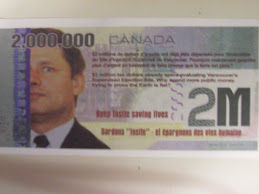
[photo credit: Vancouver Sun]
MPs' illegal drugs flyer violated rules, opponents say
Randy Shore Vancouver Sun Monday, August 18, 2008
Flyers sent out by the federal Conservative party last week violate rules that forbid Members of Parliament from using their free postage privileges to send out campaign material, opposition MPs say.
People in east Vancouver, Richmond, Port Alberni and across the country were blitzed last week with pamphlets touting the Tories' tough-on-crime approach to illegal drugs.
According to rules distributed to every MP by the office of the Speaker of the House, such flyers may not contain "provincial, municipal or local election campaign material." Nor can the flyers request "re-election support."
But the Conservative flyer includes a depiction of an election ballot with the names of four federal party leaders and an arrow pointing to Prime Minister Stephen Harper. The question above the ballot reads "Who do you think is on the right track on crime?" The flyer asks the recipient to fill out the ballot and mail it back to the House of Commons, again free of charge.NDP ethics critic Pat Martin has lodged a formal complaint with the Office of the Speaker after reviewing the drug-crime flyer for The Vancouver Sun.
"That is way over the line," Martin said, adding that the New Democrats have never depicted a ballot in MP mail-outs. "The Conservatives are really thumbing their nose at the rules."
MPs are allowed to use franking - free postage - to send out four householder flyers each year to their constituents. They are additionally allowed to send out a number of flyers up to a maximum of 10 per cent of the number of households in their constituencies, so-called "10-percenters."
Most MPs would be allowed to send 4,000 to 5,000 10-percenters under the rules. The 10-per-cent flyers have been historically used by opposition MPs to promote their parties' policies and agendas, but were not often used by governing parties that had large majorities in the House and large advertising budgets, according to Ted McWhinney, a former Liberal MP and constitutional law professor.
In recent years all the parties assumed some control over the content and distribution of 10-percenters by having MPs pool their 10-percenter franking privileges once a month to send out large-scale mailings outside the MPs' constituencies.
McWhinney calls that practice a by-product of the "increasingly imperial nature of the prime minister's office."
The parties have taken so much control over the message that MPs deliver to their constituents that it renders them "ineffectual," he said.
"When Canadians realize that communications from their MPs are really just junk mail they will simply throw them away," warned McWhinney, who wrote all of his 10-percenters personally during his two terms as MP for Vancouver Quadra.
Liberal MP Mark Holland has also launched a complaint about the flyers, claiming they are too partisan.
"The Conservative Party is using taxpayers' money to fund the printing and mailing of electoral material," said Holland in a release from the Liberal Party of Canada.
But complaints about partisan content may not go far, according to Colette Dery, a spokeswoman in the Office of the Speaker.
"It is expected that the content will be partisan," she said. "What it can't be is a solicitation for a membership in a party or for fundraising or for re-election."
The Conservative drug-crime flyer was distributed across the country, according to Conservative party spokesman Ryan Sparrow. He did not know how many of the flyers were printed.
Sparrow, who was responding to a Sun request for an interview with Conservative MP Rick Dykstra, dismissed the opposition complaints.
"Everything that goes out from the House of Commons goes through House of Commons Printing Services," Sparrow said. "They would not print anything that violated the rules."
He says the rules governing 10-percenters are not as "black and white" as the opposition suggest and that many of the Tories' flyers employ the ballot motif.
"The drug crime flyer doesn't ask who you would vote for; it asks who is on the right track," he said. "MPs are free to communicate with their constituents and Canadians any way they want."
© Vancouver Sun




No comments:
Post a Comment